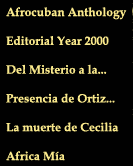| THE
FORGING OF TWIN SOULS
Langston Hughes and Nicolás
Guillén were born in 1902 just as the United States
military occupation of Cuba after the Spanish American War
ended.
Nicolás attended
Law School in Havana before giving up his course of study
for a writing career just as Hughes turned his back on Columbia
University for the same reason.
Hughes and Guillén
came from families committed to social change. Guillén’s
father had been a nationalist political leader and newspaper
editor.
Hughes grandmother’s
first husband died with John Brown at Harper’s Ferry,
having already served with his wife as a conductor on the
Underground Railroad, and his great-uncle was an outstanding
abolitionist, legislator and academic.
Both men were of mixed
race but identified with their African ancestry and extolled
their blackness. In Guillén’s March 2, 1930 interview
of Hughes for an article in El Diario de la Marina Conversación
con Langston Hughes Hughes said, “I live among my people;
I love them; the blows they get hurt me to the core and I
sing their sorrows, I express their sadness, I put their anxieties
to flight. And I do all this the people’s way, with
the same simplicity with which the people do it… I should
like to be black. Really black. Truly black!”
Guillén described
himself in his essay El camino de Harlem (The Road From Harlem)
a year earlier as “a light-skinned black with ‘good’
hair.”
Both writers made the
struggle for social justice for Negroes and the oppressed
their guiding principle in life and the inspiration for their
poetry.
In the 1920’s Hughes
and Mexican poet-Carlos Pellicer, were members of a tiny international
advance guard of literary progressives that would eventually
include Pablo Neruda of Chile, Jorge Luis Borges of Argentina,
Leopold Sedes Senghor of Senegal, Jaques Roumain of Haiti,
Aimé Cesaire of Martinique and Nicolás Guillén
of Cuba.
Langston made his second
visit to Cuba in 1930. (His first brief visit was as a young
seaman.) He was seeking (at the behest of a rich patron) a
partner to write an opera rooted in Cuban exotic primitivism.
He never found his partner, but he did find friends like Fernández
de Castro, editor of El Diario de la Marina who introduced
him to Nicolás Guillén, who was searching for
his authentic voice and later became the twentieth century’s
most important Cuban poet. Langston had attained recognition
in American literary circles with the publication of his poetry
collections The Weary Blues (1926) and Fine Clothes to the
Jew (1927), whereas Guillén had published only individual
poems in Cuban literary journals.
Guillén had published
his sonnets Al Margen De Mis Libros De Estudios in 1922, an
apologia for leaving Law School. In 1928 he began work with
Gustavo Urrutia who edited the Special Negro Page, Ideales
de una Raza, of El Diario de la Marina. This earned Guillén
a reputation as a creative opponent to the dictator Gerard
Machado.
By the time Langston Met
Nicolás in Havana in 1930, according to his biographer,
Arnold Rampersad in The Life of Langston Hughes, Vol. 1 (1902-1941),
“Hughes was essentially past major influence as a poet,
not so Guillén, who was himself thinking of Langston
Hughes’ work and its fearless racial aesthetic.”
Langston was modest and
unassuming but he personified the Harlem Renaissance, of which
his poetry was quintessential. Langston was a hero to many
young Caribbean blacks including Nicolás.
Hughes had one crucial
recommendation for Guillén – that he should make
the rhythm of the Afro-Cuban Son, the authentic music of the
black masses, central to his poetry, as Hughes himself had
done with Blues and Jazz.
Although Guillén
had previously shown a strong sense of outrage against racism
and economic imperialism, he had not yet done so in language
inspired by native, Afro-Cuban speech and dance. He had been
more concerned with protesting racism than with offering the
power and beauty of Cuban blackness.
El
ensayo completo aparece en formato .pdf aqui

|











